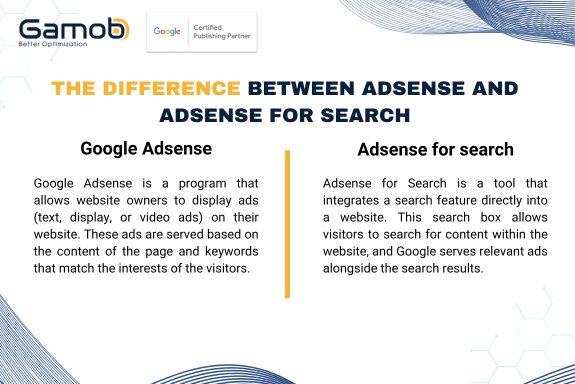Adsense For Search
How to Differentiate Between AdSense and AdSense for Search
Tracy Nguyen
February 25, 2025

Subscribe to receive the latest blog posts to your inbox every week.
By subscribing you agree to with our Privacy Policy.
When it comes to monetizing your website, Google AdSense is one of the most popular and versatile tools available. It allows website owners to earn revenue by displaying ads on their websites, and it offers different types of ad services to suit various needs. Two of the most commonly used ad solutions are AdSense (for Display Ads) and AdSense for Search (AFS). While both of these solutions can help increase revenue, they function in very different ways. Understanding these differences is crucial to choosing the best approach for your website and audience.
In this article, we’ll break down what AdSense and AdSense for Search are, how they work, their key differences, and which option may be best for your website’s monetization strategy.
What is Google AdSense?
Google AdSense is a program that allows website owners to earn money by displaying ads on their sites. Through AdSense, you can serve various types of ads including text, display, and video ads. These ads are typically displayed in ad units (banners, sidebars, or within the content) on your website. Google automatically matches ads to your site’s content and audience, ensuring that the ads are relevant to the user, increasing the likelihood that visitors will click on them.
AdSense works by using an auction-based model. Advertisers bid on keywords, and AdSense then serves the highest bidder’s ads. Website owners earn a share of the revenue each time an ad is clicked (Cost Per Click - CPC) or when it’s shown to visitors (Cost Per Mille - CPM).

What is AdSense for Search (AFS)?
On the other hand, AdSense for Search (AFS) is a specific type of AdSense product that allows website owners to add a custom search box to their site. When a visitor uses this search box to look for content on your website, Google will display relevant search results along with ads that match the search query.
The ads displayed in the search results are powered by Google Ads, and website owners earn revenue based on user interactions with these ads (usually CPC). AFS works similarly to a traditional search engine, but it is specifically integrated with AdSense to provide an opportunity for monetization. It allows website owners to provide a functional search tool while also generating revenue from the ads shown alongside search results.

Key Differences Between AdSense and AdSense for Search
Let’s now explore the core differences between AdSense (for display ads) and AdSense for Search (AFS):
1. Purpose and Functionality
The primary difference between AdSense and AFS lies in their purpose and functionality.
- AdSense is a general advertising service that shows ads on your website. These ads can be in various formats, including text, display (banners), video, and even interactive ads. AdSense is mainly used to monetize website traffic by placing ads throughout the pages of your website.
- AdSense for Search (AFS), on the other hand, focuses specifically on providing a search feature for your website. When users enter a search query, it returns search results along with relevant ads. AFS essentially combines a search engine tool with an additional revenue stream through ads, making it different from AdSense, which is primarily designed for displaying ads.
2. Ad Placement
- AdSense allows you to display ads in several different placements throughout your site. These could be:
- Banner ads at the top, bottom, or side of a page
- Text ads embedded within content or between paragraphs
- Video ads within or alongside multimedia content
- The focus here is on maximizing visibility through strategically placed ads across your site.
- AdSense for Search (AFS), however, only works in the context of a search box you place on your site. The ads are shown on the search results page after a visitor uses the search bar. The ads are contextually relevant to the search query made by the user. Unlike standard AdSense ads that can appear on any page, AFS ads only appear in response to search activity.
3. User Interaction
- AdSense operates on the premise of passive user interaction. Users don’t need to take specific actions to trigger ads; the ads simply appear on the pages of your site based on the content they are viewing. Users can click on the ads if they find them relevant or interesting.
- With AdSense for Search (AFS), the user actively interacts with the search box. They perform a search, and the search results page is generated with both content results and search ads. The ads shown are based on the search terms used by the visitor, meaning that users are more likely to see highly relevant ads related to their queries.
4. Revenue Generation Method
Both AdSense and AFS generate revenue through the CPC (Cost Per Click) or CPM (Cost Per Mille) model. However, the methods of triggering revenue differ.
- With AdSense, ads are shown throughout your site, and you earn money when visitors click on these ads or when they are shown. The revenue you generate depends on the type of ads shown, the content of your site, and the overall user engagement.
- With AdSense for Search (AFS), you earn revenue when a user interacts with the ads shown on the search results page. Since the ads are more contextually aligned with the search query, the potential for clicks is higher, especially if the user is actively looking for something specific.
5. Setup and Customization
Setting up both AdSense and AFS on your website requires different approaches.
- AdSense involves placing various ad units (banners, text ads, etc.) throughout your site. Google automatically targets ads based on the content of your pages, so it requires little configuration from your side, though customization of ad placements is encouraged for optimization.
- AdSense for Search (AFS) requires you to create a custom search engine for your website. You must place the search box somewhere visible on your pages. The search feature is relatively easy to implement, but there are fewer customization options for where the ads can appear since the ads only show up on search results pages.
6. Types of Ads Displayed
Both AdSense and AFS show Google Ads, but the types of ads displayed can vary based on the format of the ad service.
- AdSense displays a wider variety of ads, such as display ads, text ads, and video ads. These ads can be shown in a variety of placements, from small text ads to large banner ads, depending on how you configure your account and website.
- AdSense for Search (AFS), however, will typically show text-based ads that are more specific to the search query. Since AFS is tailored to a search results page, the ads are usually more relevant and targeted, based on the keywords used by the visitor.
7. User Experience
The user experience can also differ significantly between the two services.
- With AdSense, users are passively exposed to ads as they browse your content. The ads are placed in such a way that they do not disrupt the flow of the page, but may not be as directly relevant to the user’s immediate intentions.
- In the case of AdSense for Search (AFS), users actively search for content on your site. The ads that appear alongside the search results are more relevant to their specific query, providing a more personalized experience. Since the user is intentionally searching for something, they may be more likely to click on the ads, leading to higher conversion rates.
8. Ideal Use Cases
- AdSense is great for websites with high traffic and a large variety of content. Websites such as blogs, news sites, and online magazines benefit from AdSense because it provides a simple way to monetize content without relying on specific user interactions.
- AdSense for Search (AFS) works best for websites that offer a significant amount of content that visitors may want to search for. It’s ideal for niche sites or content-heavy websites where search is a crucial feature. For example, an e-commerce website, blog with deep archives, or educational platform could benefit from adding a search tool with AFS.

Which One is Right for You?
Both Google AdSense and AdSense for Search (AFS) offer opportunities to monetize your website, but they cater to different needs and website types.
- Use AdSense if you want to monetize your website through display ads that generate revenue from passive user interactions. AdSense is a versatile solution that can be used on any website, regardless of content type.
- Use AdSense for Search (AFS) if you want to provide a search feature for users while monetizing through relevant search ads. AFS is perfect for content-rich sites where search functionality can enhance the user experience.
In some cases, you can combine both solutions to maximize your earnings. By integrating display ads from AdSense and a search tool with AFS, you can diversify your revenue streams and create multiple opportunities for monetization.
By understanding the differences between AdSense and AdSense for Search, you’ll be better equipped to choose the right solution for your website and audience, maximizing your revenue potential.